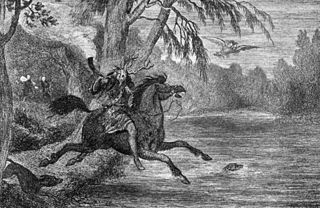Related Research Articles

In English folklore, Herne the Hunter is a ghost associated with Windsor Forest and Great Park in the English county of Berkshire. He is said to have antlers growing from his head, ride a horse, torment cattle, and rattle chains. The earliest mention of Herne comes from William Shakespeare's 1597 play The Merry Wives of Windsor, and it is impossible to know how accurately or to what degree Shakespeare may have incorporated a real local legend into his work, though there have been several later attempts to connect Herne to historical figures, pagan deities, or ancient archetypes.
Gough is a surname. The surname probably derives from the Welsh coch, given as a nickname to someone with red hair or a red complexion or as a reduced form of the Irish McGough which itself is an Anglicized form of Gaelic Mag Eochadha, a patronymic from the personal name Eochaidh, "horseman", both derivatives of Irish each "horse".
Neil is a masculine name of Irish origin. The name is an anglicisation of the Irish Niall which is of disputed derivation. The Irish name may be derived from words meaning "cloud", "passionate", "victory", "honour" or "champion". As a surname, Neil is traced back to Niall of the Nine Hostages who was an Irish king and eponymous ancestor of the Uí Néill and MacNeil kindred. Most authorities cite the meaning of Neil in the context of a surname as meaning "champion".
Large is an English surname, with variants including Lardge and Lurge. Its meaning is variable, though it may derive from the Norman French adjective, large, as it is found in the surname "le Large" in English records dating back as far as the 13th century. Harrison's work on English surnames gives the following: "Large Big; Generous [Middle English Old French large; Latin larg-us, -a, [meaning] abundant, liberal]"
Butt is a German and an English surname whose origins lie in the South West peninsula region of England.
Ahern, also Aherne is an Irish surname. Notable people with the surname include:
Ahearn or Ahearne is a surname. It descends from Echthighern mac Cennétig. Notable people with the surname include:
Halpin is an Irish surname. It is an Anglicized form of the Gaelic patronymic Ó hAlpín, meaning 'descendant of Alpin'. Other Anglicized versions of the surname include Halfpenny and Halpenny, and these variants were often used interchangeably prior to widespread literacy in Ireland. For example, the registers of St Peter's Catholic Church, Drogheda, Louth record the variations Halpin, Halfpenny, and Halpenny used throughout the 18th and 19th centuries for demonstrably related individuals.
Hynes is a surname, many examples of which originate as the anglicisation the Irish name Ó hEidhin.
Hore is an English surname, a variant of Hoare, and is derived from the Middle English hor(e) meaning grey- or white-haired. Notable people with the surname include:
The surname Monaghan is a family name originating from the province of Connacht in Ireland. Mostly a last name.
Hearn or Hearne may refer to:
Pigot is an English surname.
Rimes is a surname. It is an English surname of unexplained origin, as well as a Huguenot surname which possibly originated as a habitational surname from the city of Reims. Variant spellings include Rhymes. Statistics compiled by Patrick Hanks on the basis of the 2011 United Kingdom census and the Census of Ireland 2011 found 230 people with the surname Rimes on the island of Great Britain and four on the island of Ireland. In the 1881 United Kingdom census there were 186 bearers of the surname, primarily at Somerset. The 2010 United States census found 1,108 people with the surname Rimes, making it the 23,065th-most-common surname in the country. This represented an increase from 1,006 people (23,530th-most-common) in the 2000 census. In both US censuses, roughly eight-tenths of the bearers of the surname identified as non-Hispanic white, and one-tenth as non-Hispanic black.
Herne is a surname, sometimes an alternative spelling of Hern and Hearn. Notable people with the surname include:
Mehigan is an Irish surname. It comes from the Irish Gaelic name Ó Miadhacháin which derives from "Miadhach", which means "honourable". There are over a dozen variations on the surname, including Meighan, Meaghan, Mehegan, Megan, Meegan and Meehan.
The Hearn family is a family of Anglo-Norman origin. The name's original spelling in the 11th century was Heron or Heroun. As early as the 17th century, the spellings Hearn, Hearne, and Harn would also appear in England and the United States.
Haimes is an English language surname.
Yoe is an English surname. It is a variant spelling of Yeo, meaning "river". The word comes from Old English ea, via south-western Middle English ya, yo, or yeo. According to statistics cited by Patrick Hanks, there were 16 people on the island of Great Britain and none on the island of Ireland with the surname Yoe as of 2011. In 1881 there had been 55 people with the surname in Great Britain, primarily in Devon. In the United States, the 2010 Census found 509 people with the surname Yoe, making it the 42,579th-most-common name in the country.
References
- ↑ "Hern meaning and Hern origin, relative names". babynamecollection.com. Retrieved 2007-12-30.